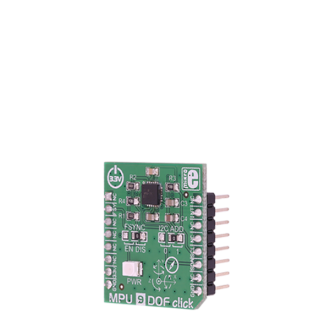
We strongly encourage users to use Package manager for sharing their code on Libstock website, because it boosts your efficiency and leaves the end user with no room for error. [more info]

Rating:
Author: MIKROE
Last Updated: 2018-08-28
Package Version: 1.0.0.1
mikroSDK Library: 1.0.0.0
Category: Motion
Downloaded: 7598 times
Followed by: 1 user
License: MIT license
Simple example which demonstrates usage of the MPU 9 DOF Click board with MPU-9150 module which integrates the accel, gyro and magnetic sensors.
STM32F407VG on mikromedia for STM32 M4 is used as a host for this example project.
Do you want to subscribe in order to receive notifications regarding "MPU 9DOF click" changes.
Do you want to unsubscribe in order to stop receiving notifications regarding "MPU 9DOF click" changes.
Do you want to report abuse regarding "MPU 9DOF click".
